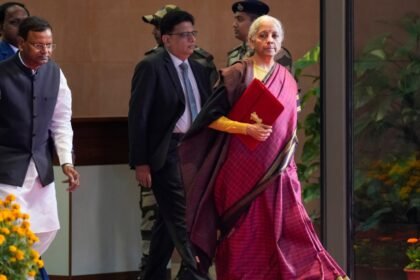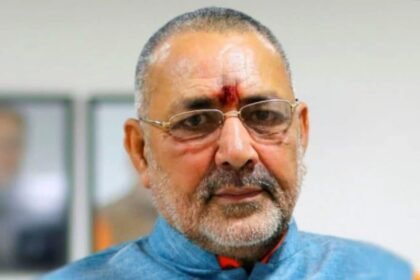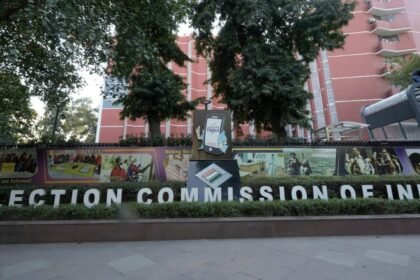Last Updated:
From attacking the EC to hinting at boycotts, Rahul Gandhi is casting his campaign in the mould of Civil Disobedience Movement, shifting the fight from ballots to the system itself

LoP in the Lok Sabha and Congress leader Rahul Gandhi addresses a press conference at AICC HQ, in New Delhi on August 7. (Image: PTI/Salman Ali)
Is this Rahul Gandhi’s ‘civil disobedience’ moment, as he intensifies his attack on the Election Commission (EC) and the BJP over the Special Intensive Revision (SIR) issue? Or are the real questions of winning polls being pushed aside?
In the 1930s, the Civil Disobedience Movement, marked by the Salt Satyagraha, was launched by the Congress under Mahatma Gandhi to take on British rule. The idea was simple yet radical: break unjust laws, defy authority, and ultimately expel the colonial power. Both the goal and the means were crystal clear.
Today, under Rahul Gandhi, the Congress appears to be aiming for something similar — defying norms, questioning every institution, and refusing to cooperate — essentially, disobeying in order to unseat the BJP. The goal is clear, but are the means? And what about the most important means of all, contesting and winning elections?
Vote Chori सिर्फ़ एक चुनावी घोटाला नहीं, ये संविधान और लोकतंत्र के साथ किया गया बड़ा धोखा है।देश के गुनहगार सुन लें – वक़्त बदलेगा, सज़ा ज़रूर मिलेगी। pic.twitter.com/tR7wh589fN
— Rahul Gandhi (@RahulGandhi) August 8, 2025
Let’s take the Bihar story. It actually traces back to the Maharashtra and Haryana assembly elections. Not just exit polls but even the Congress’s internal assessments suggested the party was on course to win both states. It did not. Many within the party, including Ashish Dua, then co-in-charge of the Maharashtra campaign, told the leadership that a weak Congress campaign and infighting had damaged its prospects.
However, those close to Rahul Gandhi concluded that the real cause was not internal failings, but the Election Commission. No stock-taking meeting was held to examine the reasons for the Maharashtra and Haryana defeats, because the top leadership remains convinced that the blame rests with the EC.
It was in this context that the EAGLE — the Empowered Action Group of Leaders and Experts — was born. Its stated mission: to detect and study weaknesses in the electoral process. And that’s what Rahul Gandhi’s recent press conference was all about.
But Bihar is waiting. There has been no formal announcement on seat-sharing yet, though party sources claim everything has been settled. In 2020, the BJP–JDU alliance polled 37.9 per cent of the vote, compared to the Mahagathbandhan’s 37.6 per cent, a wafer-thin margin. This time, the Congress-led alliance hopes to capitalise on anti-incumbency and the perceived weakening of Nitish Kumar’s political clout.
Yet while the BJP has launched its campaign in earnest under Prime Minister Narendra Modi, the Congress has yet to catch up. It is banking on the SIR issue and the RJD’s threat of boycotting the elections to generate momentum.
In Bengal, however, the SIR issue has brought the TMC and Congress together, but it has also meant that Congress’s positioning as an independent claimant in the state has weakened.
The Civil Disobedience Movement of 1930 sought to disrupt everything — to confront the British, defy all institutions, question every law, and boycott participation in governance. The aim was to strip every institution of legitimacy, build a mass movement, and force the colonial power’s downfall.
Rahul Gandhi’s strategy appears similar, but the context is entirely different.
In 1930, there was no democracy, no elections, only British rule. Today, India is a democracy, with the BJP currently in power. Under colonial rule, disruption was seen as nationalism and a fight for democracy. In today’s context, persistent defiance and disruption risk being labelled as promoting mobocracy. Unless the Congress can also demonstrate that it can win elections, its repeated allegations against the EC may not resonate with voters.
What next? Some in the party have suggested a more drastic step —boycott. Boycott polls, boycott Parliament, and in doing so, seek to erode the BJP’s legitimacy in winning elections.
The hope is that this ‘disobedience’ will spark a people’s movement. But will it? Can it?

Pallavi Ghosh has covered politics and Parliament for 15 years, and has reported extensively on Congress, UPA-I and UPA-II, and has now included the Finance Ministry and Niti Aayog in her reportage. She has als…Read More
Pallavi Ghosh has covered politics and Parliament for 15 years, and has reported extensively on Congress, UPA-I and UPA-II, and has now included the Finance Ministry and Niti Aayog in her reportage. She has als… Read More
view comments
Read More









